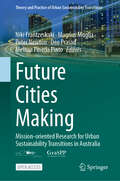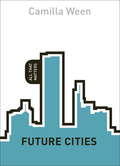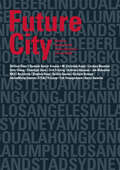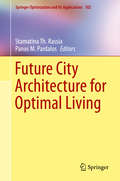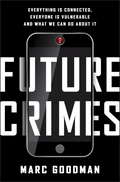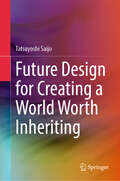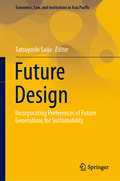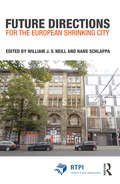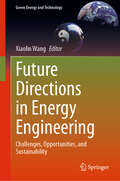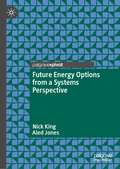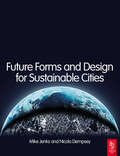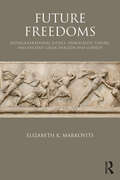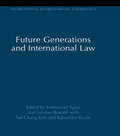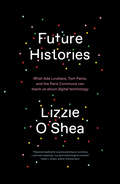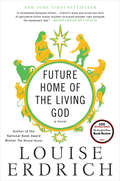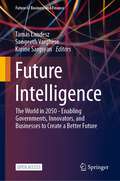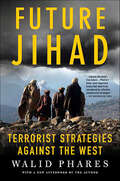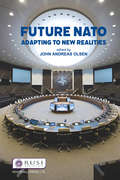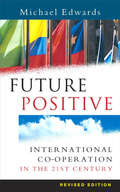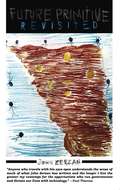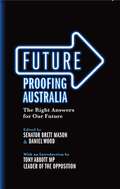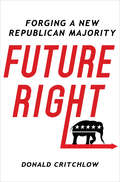- Table View
- List View
Future Cities Making: Mission-oriented Research for Urban Sustainability Transitions in Australia (Theory and Practice of Urban Sustainability Transitions)
by Niki Frantzeskaki Peter Newton Deo Prasad Magnus Moglia Melissa Pineda PintoThis open access book describes the complex dynamics that coevolve in cities and from cities, to inform agendas for urban research and urban policy with a view to future city missions. It provides a suite of research-informed chapters on urban pathways that are early signals and visions for how future cities can be shaped and transformed as well as chapters from policy, industry and intermediary organization actors that relate and respond to these pathways from a mainstreaming and implementation perspective. This edited collection intends to trigger and capture an ambitious transformative agenda amongst researchers and practitioners who have as their mission to shape urban futures. While there is proliferating literature on cities, urbanism and urban governance, this book offers a unique selling point – implying a research positioning point – to the field of sustainability transitions by intersecting research on urban sustainability transitions and missions-oriented research. The focus on the nexus of game-changers, pathways and innovations sets the book firmly in the leading edge of urban transitions research. The book engages with a breadth of disciplines including sustainability science, urban planning, urban design, mobility, energy, climate change science, urban ecology, urban sociology, architecture, data science, sustainability transitions studies, policy analysis and policy studies, as well as environmental governance. As an output, it aims to engage with and inspire future research and teaching/education in the fields of architecture and urban planning, urban design, environmental governance, sustainability science, innovation studies and urban sociology.
Future Cities: All That Matters (All That Matters Ser.)
by Camilla WeenIn Future Cities: All that Matters Camilla Ween will outline the challenges of meeting the anticipated growth of world cities over the next few decades. By 2030 it is predicted that between 80-90 % of the world's population will be living in cities, in several countries this will be 100%; Singapore is already classified as having a 100% urban population. There will be many cities with populations of over 20 million. The infrastructure required to support these cities will be a massive challenge for city planners and governments. Never in the history of civilisation has the need to deliver so much been so urgent - and with dwindling world resources. Tackling the challenges will be further complicated by pressure to develop solutions that are sustainable and include climate change mitigation measures. Some advocate geo-engineering - the large-scale engineering and manipulation of the world's environment e.g. ocean fertilisation to remove CO2 from the atmosphere, as the answer to tackling climate change. Others see this as a doomsday scenario and believe the solution lies in behaviour adaptation, changing the way we live and making do with less. Despite the difficulties, the book will chart how some cities are already tackling the problems, policies that are emerging to meet these challenges and will highlight innovations that are currently being explored.
Future Cities: All That Matters (All That Matters)
by Camilla WeenIn Future Cities: All that Matters Camilla Ween will outline the challenges of meeting the anticipated growth of world cities over the next few decades. By 2030 it is predicted that between 80-90 % of the world's population will be living in cities, in several countries this will be 100%; Singapore is already classified as having a 100% urban population. There will be many cities with populations of over 20 million. The infrastructure required to support these cities will be a massive challenge for city planners and governments. Never in the history of civilisation has the need to deliver so much been so urgent - and with dwindling world resources. Tackling the challenges will be further complicated by pressure to develop solutions that are sustainable and include climate change mitigation measures. Some advocate geo-engineering - the large-scale engineering and manipulation of the world's environment e.g. ocean fertilisation to remove CO2 from the atmosphere, as the answer to tackling climate change. Others see this as a doomsday scenario and believe the solution lies in behaviour adaptation, changing the way we live and making do with less. Despite the difficulties, the book will chart how some cities are already tackling the problems, policies that are emerging to meet these challenges and will highlight innovations that are currently being explored.
Future City
by Stephen Read Job Van Eldijk JürgenThis text focuses on cities as the dominant form of human settlement for the future, examining the transformation that is happening in urban connobations worldwide today. The last few decades have seen a rate of change and growth in cities that has never been seen before, resulting in giant metropoles with over twenty million inhabitants. This book tackles the causes of these changes, and looks at how the planning and design of cities can shape the urban future.
Future City Architecture for Optimal Living
by Panos M. Pardalos Stamatina Th. RassiaThis book offers a wealth of interdisciplinary approaches to urbanization strategies in architecture centered on growing concerns about the future of cities and their impacts on essential elements of architectural optimization, livability, energy consumption and sustainability. It portrays the urban condition in architectural terms, as well as the living condition in human terms, both of which can be optimized by mathematical modeling as well as mathematical calculation and assessment. Special features include: * new research on the construction of future cities and smart cities * discussions of sustainability and new technologies designed to advance ideas to future city developments Graduate students and researchers in architecture, engineering, mathematical modeling, and building physics will be engaged by the contributions written by eminent international experts from a variety of disciplines including architecture, engineering, modeling, optimization, and related fields.
Future Crimes: How Our Radical Dependence on Technology Threatens Us All
by Marc GoodmanFrom one of the world's leading authorities on global security, Future Crimes takes readers deep into the digital underground to illuminate the alarming ways criminals, corporations, and even countries are using new and emerging technologies against you--and how this makes everyone more vulnerable than you ever thought possible. Technological advances have benefited our world in immeasurable ways--but there is an ominous flip side. Criminals are often the earliest, and most innovative, adopters of technology, and modern times have lead to modern crimes. Today's criminals are stealing identities, draining online bank accounts and wiping out computer servers. It's disturbingly easy to activate baby monitors to spy on families, pacemakers can be hacked to deliver a lethal jolt of electricity, and thieves are analyzing your social media in order to determine the best time for a home invasion. Meanwhile, 3D printers produce AK-47s, terrorists can download the recipe for the Ebola virus, and drug cartels are building drones. This is just the beginning of the tsunami of technological threats coming our way. In Future Crimes, Marc Goodman rips opens his database of hundreds of real cases to give us front-row access to these impending perils. Reading like a sci-fi thriller, but based in startling fact, Future Crimes raises tough questions about the expanding role of technology in our lives. Future Crimes is a call to action for better security measures worldwide, but most importantly, it will empower readers to protect themselves against looming technological threats--before it's too late.
Future Design for Creating a World Worth Inheriting
by Tatsuyoshi SaijoOur world stands at a critical crossroads. While world leaders wage wars and pursue aggression, humanity faces mounting "future failures" - burdens we're leaving for generations yet unborn. Scientists warn that carbon emissions, nitrogen cycles, and biodiversity loss have already reached dangerous tipping points. Yet we possess what we call "futurability" - the capacity to find joy in creating happiness for future generations, even at the expense of immediate gains. However, our current society isn't structured to nurture this vital human trait. Drawing inspiration from the Iroquois' seventh-generation principle, we've developed and tested innovative social mechanisms through rigorous laboratory experiments and real-world applications. This book, "Future Design for Creating a World Worth Inheriting," presents our vision and practical framework for redesigning society to activate our collective futurability. Through years of research and implementation, we've created concrete solutions that can transform how we make decisions about our shared future. Join us in this crucial endeavor to create a world our descendants will thank us for - a world truly worth inheriting.
Future Design: Incorporating Preferences of Future Generations for Sustainability (Economics, Law, and Institutions in Asia Pacific)
by Tatsuyoshi SaijoThis book discusses imaginary future generations and how current decision-making will influence those future generations. Markets and democracies focus on the present and therefore tend to make us forget that we are living in the present, with ancestors preceding and descendants succeeding us. Markets are excellent devices to equate supply and demand in the short term, but not for allocating resources between current and future generations, since future generations do not exist yet. Democracy is also not “applicable” for future generations, since citizens vote for candidates who will serve members of their, i.e., the current, generation. In order to overcome these shortcomings, the authors discusses imaginary future generations and future ministries in the context of current decision-making in fields such as the environment, urban management, forestry, water management, and finance. The idea of imaginary future generations comes from the Native American Iroquois, who had strong norms that compelled them to incorporate the interests of people seven generations ahead when making decisions.
Future Directions for the European Shrinking City (RTPI Library Series)
by William J.V. Neill Hans SchlappaUrban shrinkage is rising to the top of the political agenda in Europe as more cities are shrinking in the prolonged economic downturn we encounter. Coupled with unprecedented budgetary austerity and rapidly ageing populations, ‘stagnating’ and ‘shrinking’ cities have emerged as a key challenge for policy and practice for decades to come. Local actors need to find new ways of collaborating across sectors, agencies and disciplines to unlock opportunities for interventions that mitigate the worst effects of urban shrinkage and long-term decline. Future Directions for the European Shrinking City focuses on policy and planning interventions that can be taken by municipalities and their local stakeholders to tackle stagnation and decline. With case studies from a range of European countries this book proposes ways to tackle shrinkage through governance, policy, planning, social, economic and management interventions. Edited by William J.V. Neill and Hans Schlappa, this book is ideally suited for policy makers and practitioners in urban planning, regeneration, and economic development dealing with pressing spatial and socio-economic issues on a European scale.
Future Directions in Energy Engineering: Challenges, Opportunities, and Sustainability (Green Energy and Technology)
by Xiaolin WangFuture Directions in Energy Engineering: Challenges, Opportunities, and Sustainability presents new advances and research results in theoretical, experimental, and practical sustainable energy engineering. Contributions cover case studies to explore and analyze technological advancements alongside practical applications to help readers better understand the relevant concepts and solutions necessary to achieve clean energy and sustainable development. The book brings together the latest developments in the emerging areas of intelligent power systems, green energy, and technology. Coverage includes: Electric power generation, transmission, and distribution; Power system economics, operation, and control; Energy storage and cybersecurity for smart grids; Energy efficiency in building designs and management; Sustainable materials for buildings; Integration of renewable energy sources in buildings; Greening urbanization and urban settlements. The book offers approaches to help engineers and researchers in sustainable energy engineering technologies solve practical problems affecting their daily work.
Future Energy Options from a Systems Perspective
by Aled Jones Nick KingThis book is an exploration of energy and its unique role to date as one of the fundamental enabling and controlling factors in human development and progress at the scale of global civilization, and how it will be fundamental to the type of future that collective humanity is likely to experience. The first section provides a contextual overview of energy and human civilization through a chronological description of how human energy use has evolved over time and led to the current ‘energy bind’. The second section explores what this energy bind might mean for our future energy choices when trying to meet the various challenges of dwindling resources, costs, and climate change, through exploration of three broad systems-based scenarios for the human ‘energy future’. The final section draws conclusions as to which scenario is most achievable and desirable, and what this might mean for longer-term human prospects.
Future Forms and Design For Sustainable Cities
by Mike Jenks Nicola DempseyConcentrating on the planning and design of cities, the three sections take a logical route through the discussion from the broad considerations at regional and city scale, to the larger city at high and lower densities through to design considerations on the smaller block scale. Key design issues such as access to facilities, access for sunlight, life cycle analyses, and the impact of communications on urban design are tackled, and in conclusion, the research is compared to large scale design examples that have been proposed and/or implemented over the past decade to give a vision for the future that might be achievable.
Future Forsaken: Abuses Against Children Affected by HIV/AIDS in India
by Human Rights WatchThis 209-page report documents how many doctors refuse to treat or even touch HIV-positive children. Some schools expel or segregate children because they or their parents are HIV-positive. Many orphanages and other residential institutions reject HIV-positive children or deny that they house them. Children from families affected by AIDS may be denied an education, pushed onto the street, forced into the worst forms of child labor, or otherwise exploited, all of which puts them at greater risk of contracting HIV.
Future Freedoms: Intergenerational Justice, Democratic Theory, and Ancient Greek Tragedy and Comedy
by Elizabeth K. MarkovitsWhat do present generations owe the future? In Future Freedoms, Elizabeth Markovits asks readers to consider the fact that while democracy holds out the promise of freedom and autonomy, citizens are always bound by the decisions made by previous generations. Motivated by the contemporary political and theoretical landscape, Markovits examines the relationship between democratic citizenship and time by engaging ancient Greek tragedy and comedy. She reveals the ways in which democratic thought in the West has often hinged on ignoring intergenerational relationships and the obligations they create in favor of an emphasis on freedom as sovereignty. She claims that democratic citizens must develop a set of self-directed practices that better acknowledge citizens’ connections across time, cultivating a particular orientation toward themselves as part of much larger transgenerational assemblages. As celebrations and critiques of Athenian political identity, the ancient plays at the core of Future Freedoms remind readers that intergenerational questions strike at the heart of the democratic sensibility. This invaluable book will be of interest to students, researchers, and scholars of political theory, the history of political thought, classics, and social and political philosophy.
Future Generations and International Law (Earthscan Law and Sustainable Development)
by Emmanuel Agius, Salvino Busuttil, Tae-Chang Kim and Katsuhiko YazakiSustainable development requires consideration of the quality of life that future generations will be able to enjoy, and as the adjustment to sustainable lifestyles gathers momentum, the rights of future generations and our responsibility for their wellbeing is becoming a central issue. In this, the first book to address this emerging area of international law, leading experts examine the legal and theoretical frameworks for representing and safeguarding the interests of future generations in current international treaties. This unique volume will be required reading for academics and students of international environmental law and policy. Emmanuel Agius is Senior Lecturer at the Faculty of Theology and Coordinator of the Future Generations Programme at the Foundation for International Studies, University of Malta. Salvino Busuttil is former Director General of the Foundation for International Studies. Future Generations and International Law is the seventh volume in the International Law and Sustainable Development series, co-developed with FIELD. The series aims to address and define the major legal issues associated with sustainable development and to contribute to the progressive development of international law. Other titles in the series are: Greening International Law, Interpreting the Precautionary Principle, Property Rights in the Defence of Nature, Improving Compliance with International Environmental Law, Greening International Institutions and Quotas in International Environmental Agreements. 'A legal parallel to the Blueprint series - welcome, timely and provocative' David Pearce Originally published in 1997
Future Histories: What Ada Lovelace, Tom Paine, and the Paris Commune Can Teach Us About Digital Technology
by Lizzie O'SheaA highly engaging tour through progressive history in the service of emancipating our digital tomorrow.When we talk about technology we always talk about tomorrow and the future -- which makes it hard to figure out how to even get there. In Future Histories, public interest lawyer and digital specialist Lizzie O'Shea argues that we need to stop looking forward and start looking backwards. Weaving together histories of computing and progressive social movements with modern theories of the mind, society, and self, O'Shea constructs a "usable past" that can help us determine our digital future.What, she asks, can the Paris Commune tell us about earlier experiments in sharing resources--like the Internet--in common? How can Frantz Fanon's theories of anti colonial self-determination help us build digital world in which everyone can participate equally? Can debates over equal digital access be helped by American revolutionary Tom Paine's theories of democratic, economic redistribution? What can indigenous land struggles teach us about stewarding our digital climate? And, how is Elon Musk not a future visionary but a steampunk throwback to Victorian-era technological utopians?In engaging, sparkling prose, O'Shea shows us how very human our understanding of technology is, and how when we draw on the resources of the past, we can see the potential for struggle, for liberation, for art and poetry in our technological present. Future Histories is for all of us--makers, coders, hacktivists, Facebook-users, self-styled Luddites--who find ourselves in a brave new world.
Future Home of the Living God: A Novel
by Louise Erdrich<P>Louise Erdrich, the New York Times bestselling, National Book Award-winning author of LaRose and The Round House, paints a startling portrait of a young woman fighting for her life and her unborn child against oppressive forces that manifest in the wake of a cataclysmic event. <P>The world as we know it is ending. Evolution has reversed itself, affecting every living creature on earth. Science cannot stop the world from running backwards, as woman after woman gives birth to infants that appear to be primitive species of humans. Thirty-two-year-old Cedar Hawk Songmaker, adopted daughter of a pair of big-hearted, open-minded Minneapolis liberals, is as disturbed and uncertain as the rest of America around her. But for Cedar, this change is profound and deeply personal. She is four months pregnant. <P>Though she wants to tell the adoptive parents who raised her from infancy, Cedar first feels compelled to find her birth mother, Mary Potts, an Ojibwe living on the reservation, to understand both her and her baby’s origins. As Cedar goes back to her own biological beginnings, society around her begins to disintegrate, fueled by a swelling panic about the end of humanity. There are rumors of martial law, of Congress confining pregnant women. Of a registry, and rewards for those who turn these wanted women in. Flickering through the chaos are signs of increasing repression: a shaken Cedar witnesses a family wrenched apart when police violently drag a mother from her husband and child in a parking lot. The streets of her neighborhood have been renamed with Bible verses. A stranger answers the phone when she calls her adoptive parents, who have vanished without a trace. It will take all Cedar has to avoid the prying eyes of potential informants and keep her baby safe. <P>A chilling dystopian novel both provocative and prescient, Future Home of the Living God is a startlingly original work from one of our most acclaimed writers: a moving meditation on female agency, self-determination, biology, and natural rights that speaks to the troubling changes of our time. <P><b>A New York Times Bestseller</b>
Future Intelligence: The World in 2050 - Enabling Governments, Innovators, and Businesses to Create a Better Future (Future of Business and Finance)
by Karine Sargsyan Tamás Landesz Sangeeth VargheseThe first quarter of the 21st century introduced the world to rapid uncertainty, be it the social-political and financial crises, or pandemics, or the shaking up of well-established democracies with an increasing rise in populism. At the same time, the technological promise has taken off with automation, artificial intelligence, and nanotechnologies increasingly becoming an economic reality. This open-access book brings together experts of specific domains, through the windows of their experience, and in a crowdsourced fashion, to analyze these world developments to develop an overall view, a compelling case of what we should be prepared for, as we march towards 2050. Topics covered include the future of leadership, the future of solving global challenges, and designing a way of life in harmony with nature. Other topics include disruptive entrepreneurship, the relevance of geographical borders, game-changing future innovations, education, and networked learning, interplanetary travel, and communication. The book also places an importance on the role of empathy, mindfulness, presence, and sharing becoming the anchors for future decision-making by 2050. Of general interest to anyone eager to understand the future of the world, this book is particularly useful for planners, policymakers, strategists and entrepreneurs.
Future Jihad: Terrorist Strategies Against the West
by Walid PharesFrom MSNBC terrorism expert Walid Phares, this is a frightening look into the future of jihad. Though an alarming new picture of what we can expect from terrorists in the future, Walid Phares reveals how the United States can win the war. Phares, who served as an expert with the Justice Department, briefed the Defense and State Departments, and testifies to Congress, shows that there has been a fundamental misunderstanding about al Qaeda's ultimate goal in the West and what victory means to jihadists. He answers such critical questions as: How long will this war last? Is the United States secure on the inside? Future Jihad shows how our defenses have been infiltrated; identifies the future generation of homegrown terrorists; and points the way for America to win the ideological war at the heart of jihad.
Future Knight (Roland Wright #1)
by Tony DavisIn 1409, skinny, clumsy Roland, the ten-year-old son of a blacksmith, pursues his dream of becoming a knight.
Future NATO: Adapting to New Realities (Whitehall Papers)
by John Andreas OlsenFuture NATO looks at the challenges facing NATO in the 21st century and examines how the Alliance can adapt to ensure its continued success For more than 70 years, the North Atlantic Alliance has helped to preserve peace and stability in the Euro-Atlantic area. It has been able to adjust to varying political and strategic challenges. We must ensure that NATO continues to be effective in the future. This requires looking ahead, challenging habitual approaches, exchanging ideas, and advancing new thinking. I highly recommend Future NATO to policymakers, military professionals and scholars alike, as it offers necessary critical and constructive analysis of current and future challenges posed to our security and defence.Annegret Kramp-Karrenbauer, Minister of Defence, Germany Since 1949, NATO has successfully upheld common principles and adapted to new realities. As Future NATO examines, the Alliance is facing a new set of external and internal challenges in the decades to come. The Alliance and its partners need to remain committed to future changes. I recommend this excellent study to all, but especially to the younger generation of scholars and future policymakers. Trine Bramsen, Minister of Defence, Denmark Over the last 70 years, Europe has lived in peace and prosperity because of NATO, with unity as our most important weapon. We may have our differences, but we will continue to work on our common cause to promote peace, security and stability. To effectively do so, NATO needs to continuously adapt to changing security situations. An important current challenge is to ensure European Allies take more responsibility for their security. But we also need to look at future challenges and find innovative solutions for them. Future NATO offers a useful analysis that can help us prepare for what is to come for the Alliance. Ank Bijleveld, Minister of Defence, The Netherlands
Future Positive: International Co-operation in the 21st Century
by Michael EdwardsAn optimistic assessment of the prospects for a new international order - acting as a counter-blast to global pessimism. The text explains how the international system operates, the pressures it faces and the changes it must undergo, and offers concrete ideas to re-frame international relations, foreign aid and humanitarian intervention, without using jargon or simplistic judgements.
Future Primitive Revisited
by John Zerzan"Zerzan's writing is sharp, uncompromising, and tenacious." -- Derrick Jensen "John Zerzan's importance does not only consist in his brilliant intelligence, his absolute clearness of analysis and his unequalled dialectical synthesis that clarifies even the most complicated questions, but also in the humanity that fills his thoughts of resistance. Future Primitive Revisited is one more precious gift for us all."--Enrico Manicardi, author of Liberi dalla Civiltá (Free from Civilization) "Anyone who travels with his eyes open understands the sense of much of what you have written, and the longer I live the greater my contempt for the opportunists who run governments and dictate our lives with technology."--Paul Theroux "Of course we should go primitive. This doesn't mean abandoning material needs, tools, or skills, but ending our obsession with such concerns. Declaring for community, our true origin: personal autonomy, trust, mutual support in pursuit of all the joys and troubles of life. Society was a trap--massive, demanding, impersonal and debilitating from day one. So hurry back to the community, friends, and welcome all the consequences of such an orientation. The reasons for fear and despair will only multiply if we remain in this brutal and dangerous state of civilization."--Blok 45 publishing, Belgrade As our society is stricken with repeated technological disasters, and the apocalyptic problems that go with them, the "neo-primitivist" essays of John Zerzan seem more relevant than ever. "Future Primitive," the core innovative essay of Future Primitive Revisited, has been out of print for years. This new edition is updated with never-before-printed essays that speak to a youthful political movement and influential writers such as Derrick Jensen and Paul Theroux. An active participant in the contemporary anarchist resurgence, John Zerzan has been an invited speaker at both radical and conventional events on several continents. His weekly Anarchy Radio broadcast streams live on KWVA radio.
Future Proofing Australia: The Right Answers for Our Future
by Senator Brett Mason Daniel WoodFuture Proofing Australia is a selection of essays by distinguished thinkers and doers boldly confronting the future and mapping out a path for our country.The contributors understand that ideas matter. They want to see Australia identify, confront and overcome significant challenges affecting our country, so that future generations continue to enjoy our prosperity, opportunity and lifestyle that are much envied around the world. New, fresh ideas are the lifeblood of any successful society. Without these ideas, societies stagnate and then wither-unable to either face or resolve problems confronting them.Future Proofing Australia was conceived to assist that blood flow. It is designed to inform, challenge, and lift the level of public debate.
Future Right: Forging a New Republican Majority
by Donald T. CritchlowContrary to those who argue that demographics are political destiny, social trends are transforming identity categories of race, gender, and youth - all of which provide rich opportunities for Republicans to create a new majority. To accomplish this, Republicans will need imagination and political acumen if they are to win over those constituencies that have become the base of the Democratic Party: minorities, young women, and millennials. Behind the reality of current voting patterns, which without doubt presents a gloomy future for the Republican Party, social trends and a deeper analysis of political attitudes reveal there is much room for Republican optimism. In this critical, data-driven book, Future Right, Donald Critchlow explores strategies for the right that will help them succeed where Democrats are floundering: how to speak to the new population of a rising and successful minority class and how to reform the salacious alliance between the government and the one percent.It is time for Republicans to adapt to societal trends for the creation of a new, transformative politics that will not only help them win the future elections, but revive a system long overrun by outmoded, top-heavy politics.
